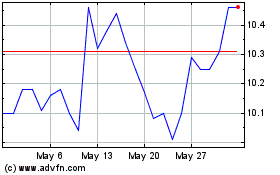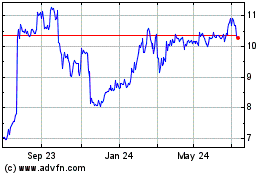U.K. Minister's Resignation Exposes Splits in Party
March 20 2016 - 10:00PM
Dow Jones News
LONDON—The resignation of a U.K. government minister citing
differences over economic policy has exposed fresh divisions within
Prime Minister David Cameron's ruling Conservative Party already
split over membership of the European Union.
Iain Duncan Smith, one of a handful of ministers who broke ranks
with the prime minister to campaign for so-called Brexit ahead of
June's national EU referendum, announced in a letter late on Friday
that he was stepping down as work and pensions minister because he
believed the government's plans to cut state support for disabled
people weren't defensible.
Mr. Duncan Smith, a former leader of the Conservative party who
had been in his post since 2010, challenged the economic
stewardship of Treasury chief George Osborne, a close political
ally of Mr. Cameron. Mr. Osborne is also seen as a key contender to
challenge for the leadership of the party when the prime minister
steps down before the next national elections due in 2020.
The disagreement about economic policy comes as the Conservative
party grapples with deep divisions over the country's membership of
the EU. Mr. Cameron and Mr. Osborne favor EU membership on economic
and security grounds, while Mr. Duncan Smith is among a group of
six senior ministers who are campaigning for Britain's withdrawal
from the bloc. The party as a whole is divided, with about a third
of its 330 lawmakers thought to be in favor of leaving the bloc
while the rest are either in favor of staying in or are
undecided.
In his first television interview since his bombshell
announcement on Friday, Mr. Duncan Smith on Sunday told the British
Broadcasting Corp. that he had quit because he was losing his
ability to influence the government's austerity drive to shrink the
budget deficit which he felt was targeting less-wealthy sections of
the population that he wanted to help.
He denied his resignation was a personal attack on Mr. Osborne
or Mr. Cameron or that it had anything to do with his stance on the
EU, but said there should be more collegiate decision-making in
government. Mr. Duncan Smith said he had considered resigning last
year over cuts to welfare, the area of spending his department is
responsible for but has been targeted by Mr. Osborne's austerity
measures.
"Yes we need to get the deficit down, but we need to make sure
we widen the scope of where we look to get that deficit down and
not just narrow it down on working-age benefits," he said.
Mr. Cameron's office responded on Sunday saying the government
was sorry to see Mr. Duncan Smith go but it was determined to
continue its work to try and help Britons have more security and
opportunity, including the most disadvantaged.
"That means we will deliver our manifesto commitments to make
the welfare system fairer, cut taxes and ensure we have a stable
economy by controlling welfare spending and living within our
means," a government spokesman said in a statement.
In his resignation letter, Mr. Duncan Smith singled out Mr.
Osborne's plans announced in his annual budget on Wednesday to make
savings of £ 4.4 billion ($6.4 billion) over the next five fiscal
years in welfare support for disabled people.
Other Conservative lawmakers had also urged Mr. Osborne to
reverse the disability benefit cuts and on Friday the government
confirmed it would rethink the plans. The reversal has raised
questions about Mr. Osborne's judgment after he scrapped other
plans to cut welfare payments in November following similar
opposition from lawmakers in his own parliament and the opposition
Labour Party.
Labour and the Liberal Democrats, the smaller centrist party
that was in coalition with the Conservatives between 2010 and 2015,
both urged Mr. Osborne to resign on Friday after Mr. Duncan Smith
quit.
"The Conservative Party is tearing itself apart over an unfair
Budget," Owen Smith, Labour's spokesman for work and pensions, said
in a statement on Sunday.
In his response to the resignation letter, Mr. Cameron said Mr.
Duncan Smith had agreed to the plans to cut disability welfare
payments along with his office and the Treasury. He confirmed the
government wouldn't proceed with the disability payment cuts and
would work over the coming months, "to get these policies
right."
"In the light of this, I am puzzled and disappointed that you
have chosen to resign," the prime minister said.
A person with knowledge of the situation in government said on
Saturday that the prime minister retained full confidence in Mr.
Osborne and added that while splits in the Conservative party over
Europe were well documented, "I would refute the suggestion that
there are huge splits on austerity."
"We had a clear austerity strategy which got us re-elected with
a majority," he said, referring to the party's victory in last
May's national elections.
Write to Nicholas Winning at nick.winning@wsj.com
(END) Dow Jones Newswires
March 20, 2016 21:45 ET (01:45 GMT)
Copyright (c) 2016 Dow Jones & Company, Inc.
Pacific Current (ASX:PAC)
Historical Stock Chart
From May 2024 to Jun 2024

Pacific Current (ASX:PAC)
Historical Stock Chart
From Jun 2023 to Jun 2024
